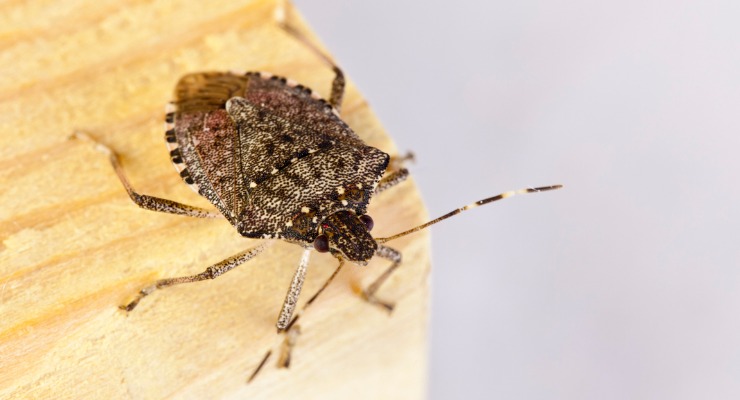
You may not have heard of the Brown Marmorated Stink Bug (BMSB) but if it interferes with your imported container, you’ll wish you never had.
It’s stink bug season and Australian border protection isn’t taking any chances. These hitch-hiking pests may delay your container because of inspection or treatment.
What is the BMSB?
BMSB are a 12-17mm (adult size) insect that looks like it has a shield on its back. The nymphs are orange and black when they first hatch, then turn brown later. Nymphs and juveniles do the most agricultural damage. The BMSB is native to Japan, China, Taiwan and South Korea. They are also known as the Japanese Stink Bug.
There are other brown stink bugs in Australia but the BMSB has distinctive light bands on the antennae and dark bands on the edge of the abdomen.
They release a foul-smelling fluid from pores on the side of their body that protects them from predators when disturbed, handled or squashed. The smell attracts other stink bugs to the area.
The bugs are not only a problem for industry but are a household pest in the 33 infected countries.
What Damage Can BMSB Cause?
The stink bug is a high priority pest in Australia and New Zealand. The bugs feed on agricultural crops including grains, citrus, soybeans, nuts, grains, berries, and some ornamental and weed species. The bugs feed on the plants’ juices and their saliva causes permanent crop damage.
Australia has seen the devastating impact BMSB has had on other countries. The bugs were first discovered in 1998 in the United States and have spread throughout many states as they hitch a ride on vehicles or fly up to two kilometres.
The US agricultural industry has suffered millions of dollars in losses from BMSB attacks on fruit and vegetable crops. With no predators, scientists are looking for a solution.
The bugs appeared later in Europe and have become a significant pest. Imports from Italy are carefully monitored for BMSB.
What Are the Risks to Your Container?
Some goods are categorised as target high risk and target risk of BMSB because of their manufacture or shipping origin. Containers coming into Australia from a high risk BMSB country have a greater chance of being unpacked and checked before release. The Department of Agriculture are warning importers to expect delays.
A delay of your container is not the only risk. The importer has to pay the cost of repacking the container if it’s checked.
High-risk cargo may need to undergo fumigation by an approved provider before release. The cargo can be treated by one of three methods:
- heat treatment
- methyl bromide fumigation
- sulfuryl fluoride fumigation
The importer also pays the cost of treatment. The additional inspection requirements and treatment of containers may delay the release of containers from now until 31 May 2020.
If you detect stink bugs (dead or alive) or any other pests in your imported goods, close the packaging or container and try to contain any escaped bugs. Report the bugs to the Department of Agriculture and Water Resources See. Secure. Report, Hotline on 1800 798 636.
Stink Bug Season 2019-20
Stink bugs are at their most active between September and April. The bugs are most likely to catch a ride to Australia during these months. The 2018-19 season saw a rise in BMSB detections at international borders.
Eight detections of BMSB were reported in Queensland, Victoria and Western Australia. In Queensland bugs were in machinery cargo from China, in WA a trap caught one near the Fremantle Port and in Victoria the bugs were in a warehouse containing terracotta pots from Italy and machinery.
The 2019-20 season for SMSB has started and the Australian Government Department of Agriculture is working with state departments to keep BMSB out.
Any imported sea cargo that departs or transits through a high-risk port may be subject to biosecurity measures. These may include:
- Some high risk goods requiring mandatory treatment for BMSB
- Random on-shore inspection for goods identified as a risk
- High risk break bulk cargo and anything not in a six sided container treated off-shore
- Random inspection of goods on arrival
- Vessel operators required to conduct daily checks of vessel and cargo and provide reporting
- Any live BMSB found on board a vessel may not be allowed to dock or sent back out to sea
If you have any queries about manufacturing in China and shipping to Australia, contact Vara Allied on (08) 6115 0118 or contact us online.